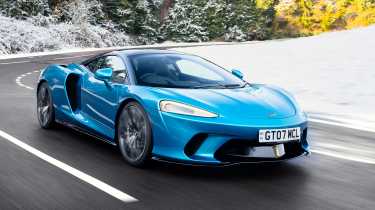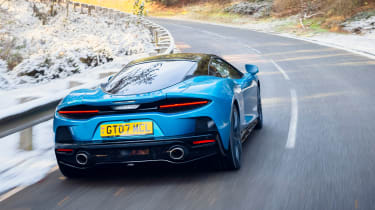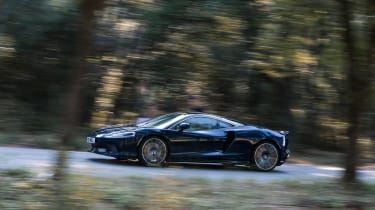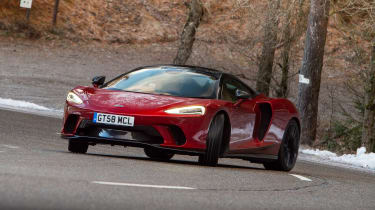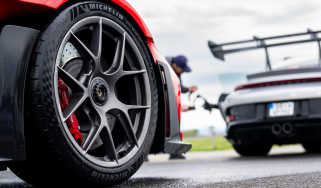McLaren GT 2022 review – a match for Ferrari’s Roma?
It might be called GT but make no mistake this is still a supercar at heart
Have you forgotten about the McLaren GT? Don’t be embarrassed, we too had pushed it to the back of our minds during the scramble to drive 765LTs and during the (long) wait for the new V6-hybrid Artura (we’re promised we’ll be driving it… soon), but still exist it does, filling that gap for those who find a 720S too extreme and the now-defunct 570S not practical enough.
Launched back in 2019 the GT is a stand-alone model in the McLaren lineup, one that’s based on a stretched Sport Series Monecell tub that’s 5mm longer in wheelbase than both the 720S and 570S and 140mm longer than the former overall. It’s also, claims McLaren, the most aerodynamic of its series production road cars thanks to its hammerhead nose and long tail design.
> Lanzante McLaren P1 HDK receives 4-litre Cosworth-fettled V8
Along with the Sport Series carbon tub it also utilises the 570S’s aluminum double-wishbone suspension and adaptive dampers, but the power steering and 4-litre twin-turbo V8 are from the 720S, albeit the latter is detuned to 611bhp and has an eight percent higher compression ratio and more responsive, low inertia turbos. Peak torque of 465lb ft is not to be sniffed at in a car that weighs 1530kg with fluids and can deliver 95% of that from 3000rpm. Like all McLarens the GT is an absurdly quick supercar, regardless of the name it’s been christened with.
More reviews
Ah yes, the name. It’s not really a GT car, though is it? Bentley Conti GT, Ferrari Roma, Aston DB11, Lexus LC500, even Jaguar’s F Type, they are GT cars. Cosseting, stylish, brutally quick when required, soothingly refined when needed. Performance aside the McLaren GT isn’t any of these, certainly not based on our previous time with the car which has included a GT car lengthy drive from the foothills of the Alps to the UK. Quick, blisteringly so, engaging, fun, richly rewarding it was all those things, but as evo’s Deputy Editor Adam Towler and staff photographer Aston Parrott suggested, a GT car it wasn’t. And not only because it couldn’t carry much of their light luggage.
So what’s changed in the three years since its launch? Not a great deal, but for 2022 the model year updates rationalise the GT’s trim options and some under the skin updates are said to improve the car’s NVH. The aluminium trim remains to lift the cabin and differentiate it from the 720S and the dihedral doors are lighter to help egress and ingress.
All three of the new option packs McLaren has devised for the GT: Luxe (power seats and steering column, soft grain Aniline leather throughout, aluminium, and gloss black interior trim), Practicality pack (nose lift, rearview camera, front and rear parking sensors, folding and heated door mirrors) and the Premium pack (LED adaptive headlights, Bowers & Wilkins 12 speaker stereo, power-operated rear tailgate and a cabin air purification system), are a no-cost option, which begs the question: why not fit it all as standard? Another freebie is the sports exhaust.
The GT is, according to McLaren, a real, proper honest-to-goodness gran turismo. Comfortable, refined, luxurious and capable of carrying a set of golf clubs or several pieces of tailor-made luggage of questionable taste. So can a mid-engined, supercar-shaped car made out of the carbonfibre bones of searing supercars really be a GT? Or is it just a softer, less focused, less exciting supercar?
Engine, transmission and 0-60mph time
No surprises here. The new GT, which costs £163,000 (around £45,000 less than a 720S), is powered by the familiar 4-litre twin-turbocharged flat-plane-crank V8, albeit here with a higher compression ratio (9.4:1, up from 8.7:1) for improved torque and a bit less of that crazy 720S top-end power.
The engine, designated M840TE, produces 611bhp at 7500rpm and 465lb ft from 5500 to 6500rpm, with 90 per cent of that torque output available between 3000 and 7250rpm. It’s hooked up to a seven-speed dual-clutch gearbox. McLaren claims 0-60mph in 3.1sec, 0-124mph in 9.0sec and a top speed of 203mph. Which all sounds very, er, super.
Technical highlights
Can you guess? Of course you can. Carbonfibre monocoque (here dubbed MonoCell II-T, the T standing for Touring), aluminium double wishbone suspension and all that other good stuff. This level of perceived commonality across McLaren’s line up is annoying to some, but taken in isolation it’s hard not to be impressed with the attributes they all contribute towards: a weight of 1530kg (for comparison a DB11 V12 is 1875kg, a 911 Turbo S 1675kg), a suspension system capable of delivering exceptional roll stiffness with superb ride quality, and an incredibly stiff structure to allow precise tuning.
With the GT McLaren introduced what it calls Proactive Damping Control, which uses sensors to proactively prime the dampers for irregularities in the road surface, softening the ride when required, but without compromising overall body control. The GT does not use the 720S's hydraulically cross-linked suspension, rather a more traditional combination of coil springs, adaptive dampers and anti-roll bars.
Perhaps more important for the GT is the much-improved luggage capacity across the front and rear compartments, which amounts to 570 litres, the chasing out of unwanted noise with revised wheelarch liners, NVH material and things such as new seats (thank goodness, as the ‘Comfort’ seats in the 570S and 720S are pretty awful), plus superb front-end clearance and a monster 1200W Bowers & Wilkins stereo. Lots of work has been done on engine noise to create a more GT-appropriate soundtrack, too.
What’s it like to drive?
Different. No, genuinely. Of course, there’s a lot of familiarity in here. The look and feel, the wonderful view out, the lovely sense of supple agility that always pervades McLarens. However, the engine response is markedly changed and the strong, torquey delivery makes for effortless progress without the sheer unhinged lunacy of a 720S or even a 600LT. It’s effective, addictive even, but there’s a quieter, more grown-up vibe. Allied to a remarkably calm, spookily supple ride and the more measured steering response, the overall effect is that the GT remains quite obviously a McLaren, but one with a calmer, more subtle personality. It’s hard to pretend missing the laser precision of the 720S, or the frenzied bolt of power as the revs rise, but most GT owners won’t be jumping between the two.
It trickles through town easily, the brake actuation is smoother, road noise is soothed away (to be replaced by some suspension noise) and on a smoothly surfaced autoroute it’s an extremely civilised place to be. Does it tick all the GT boxes? Perhaps it lacks the bruising, indomitable, relentless feel of something front-engined and heavyweight – it is still obviously a McLaren, and therefore never relaxing in the way a Bentley Continental GT can be. But in terms of actual capabilities, it’s on the money.
So, away from the autoroutes do those supercar genes elevate it as a driver’s car, too? Initially the answer is a bit of a surprising ‘no’. Through fast sweepers the GT feels fluid, fast and pretty nimble, but there’s no question it lacks the tactility and sweet, lightweight feel of a 570S. As with other McLarens you can adjust the powertrain and handling settings with two rotary switches to select Comfort, Sport or Track mode, but here the set-ups are considerably backed-off. For the suspension, Comfort feels slightly floaty and disconnected, and the body control just isn’t tight enough. Fair enough.
Sport mode is much more like it, but even so, there’s a slight disconnect between input and action and nothing like the unerring accuracy of other McLarens. It can result in you driving everywhere in Track mode, just to sharpen everything as much as possible.
In the tighter stuff the GT occasionally groans under the weight of 1530kg. Literally in the case of the brakes. Ceramic brakes are optional and the standard system is right on the limit of what’s acceptable for such a quick car. The pedal goes long pretty quickly and doesn’t come back for some time. And boy do the front tyres get a workout! The GT just doesn’t have the crispness of turn-in you’d expect and can understeer a surprising amount if you start really going hard. If you have driven an Elise with narrow front rubber you’ll be familiar with the sensation, where you always have to be mindful that you don’t overload the front end, working instead to shift the weight balance and get the nose turned in before being too greedy with the throttle.
However, it’s also extremely difficult to look at the GT’s shape, hardware and badge and not judge it as a supercar, pure and simple. Maybe that’s unfair. The GT is meant to be a, um, GT and so expecting 720S levels of grip and control is unrealistic. Is it sharper, more composed and more fun than a DB11 AMR? Arguably, yes. And whilst that slightly softer body control makes for a calmer, less frenzied and less precise gait, it also provides quite amazing progression. Once you’ve learnt to give the front tyres a fighting chance on turn-in and got the engine on boost, the GT can be made to slip and slide in almost slow motion. Small, efficient slides or big, smoky monsters for the cameras – the GT can do it all.
In the end, how you judge the GT is a question of philosophy. If you think a grand tourer is front-engined and all about big, muscular character then this thing is not for you. However, it’s easy to come to enjoy its mix of restrained supercar aesthetic, fluid dynamics and ultra-progressive handling balance. If they could knock back a bit of the understeer, tighten up the body control just a shade…
Price and rivals
At £163,000 the GT is right on top of the V12-powered Aston Martin DB11 and Bentley Continental GT on the more traditional side of things and a good chunk more than the Audi R8 Performance or 911 Turbo S on the useable sports car/supercar side and the Ferrari Roma has it covered in terms of both performance and GT opulence. Of course, it’s also faster, lighter, made from more exotic materials and certainly feels as special as even the Aston or Bentley in its own way.
There’s no question that the GT makes a strong case for itself. But for some it won’t capture the do-anything-but-still-tear-your-face-off excitement of the 911 Turbo S, nor the old-school glamour and character of the DB11. However, it does mix and match elements of the two into something with its own identity.
A true GT? Not as we know it. But it just manages to avoid feeling like a dumbed-down supercar, too. A used Ferrari GTC4 Lusso T might speak more to all those south-of-France gran turismo fantasies and fit a couple of extra passengers, too. But on those roads above Cannes, Nice and St Tropez, the McLaren is more at home.

